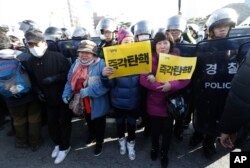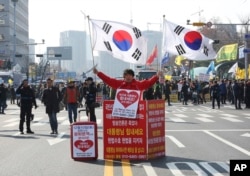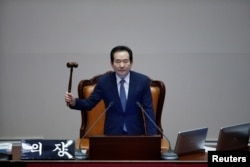The South Korean National Assembly has voted to impeach President Park Geun-hye.
With 234 of the parliament's 300 members voting Friday for impeachment, the measure gained more than the two-thirds majority support needed.
The stunning and sudden collapse of Park’s presidency was caused by recent allegations that a multi-million dollar influence peddling scandal was being run out of the Blue House.
After the vote, Chung Se-kyun, the speaker of the National Assembly, urged the government to heal the divisions and political turmoil that has paralyzed it over the scandal.
"By passing of the impeachment motion, political uncertainty has been considerably settled down. The government officials should steadfastly put utmost effort into caring for the lives of our people," said Chung.
The South Korean Defense Ministry has ordered the military on a heightened surveillance and readiness posture.
Tarnished image
The president’s image as a strong and incorruptible leader crumbled under allegations that her longtime friend, Choi Soon-sil, secretly exploited her close relationship with Park to force Korean conglomerates to donate nearly $65 million to two dubious foundations, while at the same time funneling some of the funds and lucrative side contracts to companies she and her friends owned.
With the impeachment vote's passage, Park has been immediately suspended from office. Prime Minister Hwang Kyo-ahn has become acting head of state.
The Constitutional Court will have six months to review the legitimacy of the impeachment motion. If the court affirms, a new presidential election will be scheduled within two months of the ruling.
Park met with her Cabinet in the Blue House following the impeachment vote and afterward read a statement to the press.
"I gravely accept voice of the National Assembly and our people, and I am sincerely wishing this crisis to be finished well,” Park said.
Park had refused to resign, but said she would abide by the impeachment vote's outcome and plead her case before the Constitutional Court.
Prior to the vote
She maintains the actions she took were in the national interest and insists she never personally benefited during her 18 years of public service. She also offered three public apologies for not being aware that some of her close associates may have been involved in wrongdoing.
On Friday, Park apologized once again.
"Thinking of the heart of our people who are looking at the current situation, I am very agonized and sorry," she said.
The 64-year-old Park was the daughter of a military ruler who led the country for 18 years before being assassinated in 1979. She now becomes South Korea’s first democratically elected leader to be removed from office.
After Park’s impeachment was announced, demonstrators in front of the National Assembly celebrated. The scandal had sparked weeks of massive public protests across the country demanding Park’s removal from office. Her approval rating plummeted to just 5 percent.
In addition to a Justice Ministry investigation into the corruption scandal, the National Assembly has authorized an independent counsel to investigate the president and is conducting televised committee hearings as well.
Inter-Korean relations
South Korea will now be without a strong leader while regional tensions are high over North Korea’s increasing nuclear threat, and with disruptive change in American leadership under way that could test the country’s close alliance with the United States.
North Korea has refrained in the last two months from conducting missile tests or other provocations that could shift attention from Park’s political turmoil.
The North Korean media have portrayed the scandal as an example of widespread corruption in the South Korean government, but have downplayed the power of public protests to force a change in leadership.
“I think North Korea is worried the candlelight vigils in South Korea could be a stimulant for a similar case that could happen in North Korea,” said North Korean defector Ahn Chan-il with the World Institute for North Korean Studies.
With Park impeached, Ahn says, Pyongyang likely will try to test the new leadership in Seoul by conducting a missile test or staging a cross-border military provocation.
Few expect any immediate policy change from the interim government, but the president’s fall will likely bring a reexamination of her hard-line approach to dealing with the authoritarian and repressive Kim Jong Un government.
Some opposition leaders were critical of the president’s decision to sever all remaining ties and channels of communications with Pyongyang, including closing the jointly run Kaesong industrial complex, after the North conducted a nuclear test in January.
“The track record of the past 4 1/2 years is a rather clear testimony that pressure only would not work. And it gives all the related parties reason to doubt whether continuation of the same policy is the best policy,” said analyst Bong Young-shik with Yonsei University Institute for North Korean Studies in Seoul.
US alliance
The turmoil in Seoul may also complicate relations with the incoming administration in January of U.S. President-elect Donald Trump.
During the campaign, Trump had been critical of South Korea for what he said was not fairly reimbursing the U.S. for the cost of stationing 28,000 American troops in country, and for unfair trade practices. After the election, the president-elect did offer some reassurance he will continue to uphold U.S. regional security commitments.
Trump’s views on North Korea are unclear. Some hawkish Republicans are urging him to take a tougher stand against Pyongyang’s continued testing of ballistic missiles and nuclear weapons.
President Park enjoyed a very close relationship with Washington. Both sides embraced the same tough polices of sanctions and deterrence against North Korea. This year Park agreed to deploy the controversial THAAD American missile defense system in the country over the objections of China.
Without the conservative Park in office, the divided South Korean government may move away somewhat from its close ties with the U.S. to try to reduce tensions with North Korea and China.
But regional security analyst Daniel Pinkston with Troy University in Seoul expects the common national concerns over North Korea’s advancing nuclear program to keep the alliance intact.
“We do go through these turbulent times, but I’m confident that the national interests will not change fundamentally or significantly. So I expect the two countries to maintain a close relationship,” said Pinkston.
Bong Young-shik, however, expects the interim government to postpone the deployment of THAAD to appease Beijing’s concerns about the perceived American military build-up on the Korean Peninsula.
“It takes a great deal of time to actually carry out the decision. So there will be a reasonable amount of time available to both sides to coordinate the actual deployment of THAAD,” he said.
Youmi Kim contributed to this report.







